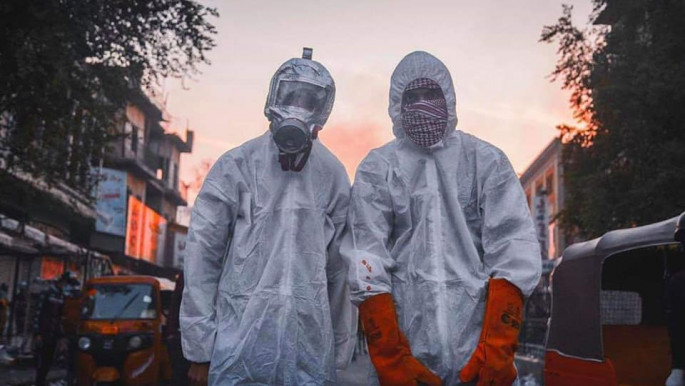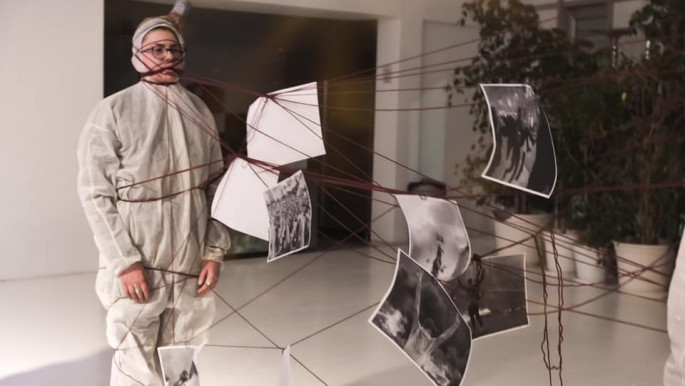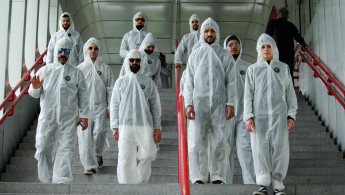Iraqi performing troupe in Vienna use shock art to highlight indifference to Iraqi lives
From his studio in Vienna's heart, co-founder Hawy Rahman describes the collective's birth as a byproduct of life circumstances and political developments in his native Iraq that he fled 20 years prior.
Abroad, Hawy resumed his life as an Iraqi sculptor and pursued higher education in the field of performance and conceptual art in a city where hundreds of Iraqis have recently migrated to.
Dar Al'Artivism's core membership, from thespians, dancers, fine artists and dramatists, belong to the latest crop of Iraqi refugees to have arrived in Austria since 2015.
"Born in the 90s and 2000s, these youngsters represent a new generation," Hawy told The New Arab. "Mine" he quipped, "whose lives began during the 80s Iran-Iraq war, was defined by fear – Jeel al Khayfeen".
As a "son of war," Hawy describes how his established connections and language fluency in Vienna has helped build a bridge between these generations and empowered the self-propelled collective to stand autonomously.
 |
As a 'son of war,' Hawy describes how his established connections and language fluency in Vienna has helped build a bridge between these generations and empowered the self-propelled collective to stand autonomously |  |
The 80's born artist houses the collective at his personal studio where ideas are shared, exchanged and refined.
Before starting their lives anew, life for these artists, like their counterparts back home, grew flat and flavourless as grand corruption reigned supreme. Shared memories and experiences between them compelled Vienna's Iraqi-diaspora to stage protests of their own; away from the expected sites such as the Iraqi embassy in support of torch-bearers at home.
The group's unorthodox methods tie a knot between political activism and conceptual art.
 |
|
 |
|
Setting them apart from other diaspora staged protests in Europe is the medium of silence and their chosen uniform of white coloured hooded boiler suits bearing the words "save the Iraqi people" a slogan and hashtag launched last October to raise global attention to the onslaught of Iraqi lives.
Along Mariahilfer Street, Vienna's own Champs Elysees, performers dispersed themselves around one performer who lay on the floor, body squirming, as though succumbing to involuntary spasms.
 |
The jolts and spasms represent the sudden death of youngsters from blows to the head by tear gas canisters and live bullets |  |
The jolts and spasms represent the sudden death of youngsters from blows to the head by tear gas canisters and live bullets.
The words "30 million Iraqis in complete isolation from the world after the internet was cut off" could hardly be avoided by members of public passing by.
"The white overalls were a conscious decision," Hawy tells The New Arab, "signifying not only the innocence of youngsters killed but also their commitment to non-violence.
All that people took to the streets" Hawy said "were their bodies and mobile phones".
The group's ominous uniformity, combined with dance and spontaneity intends not to inform but to shock onlookers as it confronts them with daily reality of violence in their motherland.
Other performances, such as that curated by Iraqi artist Hussein Waham, reflect on memory and displacement.
With his head inside of a suitcase Waham says "the bag is the head that is filled with all kinds of memories." Around his wrists are red wool stretching out across the performance hall, Waham describes these as "the arteries that carry blood that had been spilling for a longtime due to continuous violence".
 |
|
"Many of us were deeply affected and taken aback by the senseless violence meted out against youngsters," Hawy said.
Dar Al'Artivism's choreographed performances draw a line under the schism between state forces, intent on violent means and the people's commitment to non-violent resistance, as well as global indifference to whether Iraqis live or die.
Members often form in a line or assemble in other constellations, await the blow of a whistle which grows into an unsettling cacophony.
This signals them to start walking through the streets and boulevards of Vienna and their commitment to silence makes for a striking visual statement that both confuses and intrigues onlookers.
"It's an easy choice," Hawy describes, "when the language of words loses its potency or is misused".
The visual vocabulary was on full display last October during the group's protests outside the United Nations headquarters.
In the presence of hundreds of police officers, the collective occupied Platz der Menschenrechte with their boiler-suit clad bodies for a six-hour long performance. They held a candle-lit vigil, symbolising not only those killed but also those that have survived the brutality of state forces, Hawy told The New Arab, along other activities from interpretive dances and spoken word poetry.
 |
In symmetry with popular protests in their motherland, Vienna's streets serve the group like a canvas would to a painter |  |
Hawy spoke of the need to "deliver art to the people" outside of the spaces where art is traditionally confined, from theatre houses to art galleries. In symmetry with popular protests in their motherland, Vienna's streets serve the group like a canvas would to a painter.
Interpretive dance is an expressive tool that mimics the pain inflicted on the Iraqi public who for 17 years have been suffering in silence. In one such performance, the limbs and facial expression of one artist could be seen contorting and contracting in step with the beat of percussion drums, as life outside the performance continues unaffected.
Beyond street performances members have pooled their individual talents to collaborate with institutions such as Brunnenpassage and other art institutions, hosting talks, information days and planning an upcoming three-day symposium in March.
"People here [in Vienna] want to understand but people live their lives in detachment from what happens in Iraq", he said. Interest is tinged with suspicion, he told The New Arab, "but people do engage."
Hawy reels off the questions that the police quizzed him with upon seeking permission to stage the protest outside of the UN headquarters, bemused by what he considered to be irrational fears and distrust.
"Why here, why don't you protest in Iraq,'' to mention but a few, Hawy recalled as well as his fondest memory in which a police officer shared a hug with an artist at the UN protest thanking him for the protest. "Turns out he thoroughly enjoyed it,'' Hawy added.
 |
|
Once the performance has ended, artists break their silence as they distribute themselves along separate metro carriages to engage in conversation with members of the public.
The use of shock art reveals the dual role artists perform.
On the one hand they observe and transmit the reality of violence against their comrades but the subtext of their performances offer an insightful social critique. What is the role of the masses? What is the cost of freedom and indifference are important question their art provokes.
The art collective is not merely an abstraction but one that engages directly with artists inside Iraq. Before supporters of the Sadrist movement violently dislodged peaceful protesters from Tahrir Square, the epicentre became home to a colourful array of tents, including the Cinema of the Revolution tent.
Founded by independent Iraqi filmmakers and artists, the tent held talks and screenings including Salmeeya by Iraqi artist Muha Nad Rasheed, a member of Dar Al'Artivism.
The twinning between artists at home and abroad collapses what separates them as part of a growing transnational movement.
"Youth back home are the mirror we see ourselves in," Hawy said. "They are tearing down every taboo and setting a new standard for the lives they want."
Inspired by Dar Al'Artivism, others chapters are beginning to mushroom from Belgium, Norway and potentially other European cities home to Iraqi artists but returning back home to contribute knowledge remains the collective's future vision.
Nazli Tarzi is a freelance British-Iraqi journalist, specialising in Middle East politics, with a particular interest in Iraqi affairs
Follow her on Twitter: @NazliTarzi



